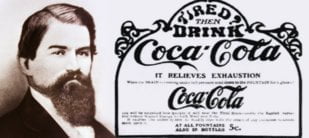
It was invented by a morphine addict who was experimenting with various painkillers to help him live with the sabre wound he had sustained in the Civil War.
Who was he?
John Stith Pemberton was an American biochemist and Confederate States Army veteran who had fought in the American Civil War.
He was wounded by sabre at the Battle of Columbus. To live with the pain, he became a morphine addict. This led him to experiment with various painkillers and toxins which eventually led to the recipe of Coca-Cola.
Pemberton went on to the Reform Medical College of Georgia in Macon, Georgia, where, by the age of nineteen he got a medical degree. As chemistry was his interest, he opened a drug store in Columbus.
Pemberton’s French Wine Coca.
He started experimenting to find an alternative to morphine.
Eventually, using extracts of kola nut and damiana he developed a drink he called Pemberton’s French Wine Coca.
At the time there was a lot of public anxiety about drug addiction, depression, and alcoholism among war veterans, what we now call post-traumatic stress disorder, not only among the soldiers but also with highly-strung Southern women. So, Pemberton had a ready market for his medicine.
The arrival of temperance Legislation
In 1886, Atlanta and Fulton County enacted temperance legislation. He made a non-alcoholic version of his Coca. This he did with a drugstore owner, Willis E. Venable, who helped him perfect his recipe, which they created by trial and error. Then by accident, when trying to make another glassful of the beverage, he blended the base syrup with carbonated water. Pemberton realised that he could sell this as a drink rather than a medicine.
Then Frank Mason Robinson, his bookkeeper, suggested that the company should be called “Coca Cola” simply because he thought two c’s would look good in adverts. He then hand wrote the name on bottles and adverts, both of which have stood the same over the years.
Of course, Pemberton now made many health claims for his product, touting it as a “valuable brain tonic” that would cure headaches, relieve exhaustion, and calm nerves, and marketed it as “delicious, refreshing, pure joy, exhilarating”, and “invigorating”.
Then the birth of the Coca Cola company!
Soon after Coca Cola hit the market, Dr Pemberton fell ill and nearly went bankrupt, so he decided to sell Coca Cola, as he was sure that someday it would be a national drink. His initial idea was to keep a percentage, but his son was desperate for money so in 1888 he sold the patent to a fellow pharmacist, Asa Griggs Candler for just $1,750, which in today’s money is $47,230.
Asa Griggs Candler then in 1892 founded The Coca-Cola Company, which has grown into the colossus we know today.
Isn’t History Fun!
10 questions to discuss:
- Motivation for Innovation: How did John Pemberton’s experiences in the Civil War and subsequent morphine addiction influence his search for alternative pain relief?
- Composition of Pemberton’s French Wine Coca: Beyond kola nut and damiana, what other ingredients were included in this initial “medicine”?
- Public Context: How did widespread concerns about substance abuse among veterans and societal anxieties shape the market for Pemberton’s alternative solutions?
- Development Process: Can you elaborate on the “trial and error” approach used by Pemberton and Venable to perfect the Coca-Cola recipe?
- Carbonation as Accident: Was the discovery of carbonated Coca-Cola purely accidental, or were there any existing trends or inspirations leading to this experimentation?
- Branding and Marketing: Beyond the name suggestion, what other marketing strategies did Pemberton and Robinson employ to promote Coca-Cola initially?
- Health Claims and Misconceptions: How did the health claims associated with early Coca-Cola marketing compare to the actual effects of its ingredients?
- Financial Struggles and Missed Opportunities: What factors led to Pemberton’s financial difficulties and his decision to sell Coca-Cola shortly after its invention?
- Asa Griggs Candler’s Contribution: How did Candler’s leadership and strategies contribute to the transformation of Coca-Cola from a local drink to a global brand?
- Ethical Considerations: Considering the historical context and health claims, do you think Pemberton’s invention had more positive or negative consequences for society?
The aim of these questions it to go beyond the basic facts of the invention and encourage critical thinking about the motivations, process, and broader impact of Coca-Cola’s creation. They also explore ethical considerations regarding its marketing and public perception.
For more on this story, click here:

